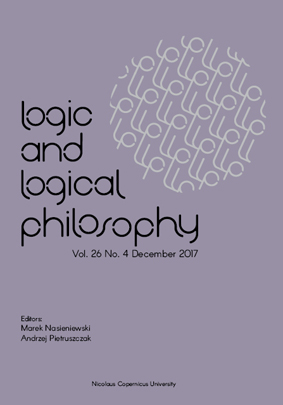Further Reflections on Sentences Saying of Themselves Strange Things
DOI:
https://doi.org/10.12775/LLP.2017.004Keywords
diagonalisation, factivity, incompleteness, necessitation, reductio ad absurdum, semantic paradoxes, truthmakingAbstract
Milne [2005] argued that a sentence saying of itself that it does not have a truthmaker is true but does not have a truthmaker. López de Sa and Zardini [2006] worried that, by parity of reasoning, one should conclude that a sentence saying of itself that it is not both true and short is true but not short. Recently, Milne [2013] and Gołosz [2015] have replied to López de Sa and Zardini’s worry, arguing in different ways that the worry is illfounded. In this paper, I’ll address these replies and argue that they fail to dispel López de Sa and Zardini’s worry, bringing out in the process some broader points concerning the use of self-referential sentences in arguments in philosophy of logic.
References
Asenjo, F., “A calculus of antinomies”, Notre Dame Journal of Formal Logic, 7 (1966): 103–105. DOI: 10.1305/ndjfl/1093958482
Barrio, E., and G. Rodríguez-Pereyra, “Truthmaker maximalism defended again”, Analysis, 75 (2015): 3–8. DOI: 10.1093/analys/anu121
Clark, M., Paradoxes from A to Z, Routledge, Abingdon, 3rd edition, 2012. DOI: 10.4324/9780203465929
Gödel, K., “Über formal unentscheidbare Sätze der Principia Mathematica und verwandter Systeme I”, Monatshefte für Mathematik und Physik, 38 (1931): 173–198. DOI: 10.1007/BF01700692
Gołosz, J., “In defence of an argument against truthmaker maximalism”, Logic and Logical Philosophy, 24 (2015): 105–109. DOI: 10.12775/LLP.2014.018
Halbach, V., and A. Visser, “The Henkin sentence”, pages 249–263 in M. Manzano, I. Sain, and E. Alonso (eds.), The Life and Work of Leon Henkin, Birkhäuser, Basel, 2014. DOI: 10.1007/978-3-319-09719-0_17
Kaplan, D., and R. Montague, “A paradox regained”, Notre Dame Journal of Formal Logic, 1 (1960): 79–90. DOI: 10.1305/ndjfl/1093956549
Kolmogorov, A., “O principe tertium non datur”, Matematičeskij sbornik, 32 (1925): 646–667.
Löb, M., “Solution of a problem of Leon Henkin”, The Journal of Symbolic Logic, 20, 2 (1955): 115–118. DOI: 10.2307/2266895
López de Sa, D., and E. Zardini, “Does this sentence have no truthmaker?”, Analysis, 66, 2 (2006): 154–157. DOI: 10.1093/analys/66.2.154
López de Sa, D., and E. Zardini, “Truthmakers, knowledge and paradox”, Analysis, 67, 3 (2007): 242–250. DOI: 10.1093/analys/67.3.242
López de Sa, D., and E. Zardini, “No-no. Paradox and consistency”, Analysis, 71, 3 (2011): 472–478. DOI: 10.1093/analys/anr044
MacBride, F., “Truthmakers”, in E. Zalta (ed.), Stanford Encyclopaedia of Philosophy, 2013. http://plato.stanford.edu/entries/truthmakers/
Maudlin, T., Truth and Paradox, Oxford University Press, Oxford, 2004. DOI: 10.1093/0199247293.001.0001
Milne, P., “Not every truth has a truthmaker”, Analysis, 65, 3 (2005): 221–223. DOI: 10.1093/analys/65.3.221
Milne, P., “Omniscient beings are dialetheists”, Analysis, 67, 3 (2007): 250–251. DOI: 10.1093/analys/67.3.250
Milne, P., “Not every truth has a truthmaker II”, Analysis, 73, 3 (2013): 473–481. DOI: 10.1093/analys/ant037
Rodríguez-Pereyra, G., “Truthmaker maximalism defended”, Analysis, 66, 3 (2006): 260–264. DOI: 10.1093/analys/66.3.260
Rosser, J., “Extensions of some theorems of Gödel and Church”, The Journal of Symbolic Logic, 1 (1936): 87–91. DOI: 10.2307/2269028
Tarski, A., Pojęcie prawdy w językach nauk dedukcyjnych, Nakładem Towarzystwa Naukowego Warszawskiego, Warsaw, 1933.
Zardini, E., “Truth and what is said”, Philosophical Perspectives, 22 (2008): 545–574. DOI: 10.1111/j.1520-8583.2008.00157.x
Zardini, E., “Truth without contra(di)ction”, The Review of Symbolic Logic, 4 (2011): 498–535. DOI: 10.1017/S1755020311000177
Zardini, E., “Getting one for two, or the contractors’ bad deal. Towards a unified solution to the semantic paradoxes”, pages 461–493 in T. Achourioti, K. Fujimoto, H. Galinon, and J. Martínez (eds.), Unifying the Philosophy of Truth, Springer, Dordrecht, 2015a. DOI: 10.1007/978-94-017-9673-6
Zardini, E., “∀ and ω”, pages 489–526 in A. Torza (ed.), Quantifiers, Quantifiers, and Quantifiers: Themes in Logic, Metaphysics, and Language, Springer, Dordrecht, 2015b. DOI: 10.1007/978-3-319-18362-6
Zardini, E., “First-order tolerant logics”, The Review of Symbolic Logic, 2016a. Forthcoming.
Zardini, E., “Unstable knowledge”, ms, 2016b.
Downloads
Published
How to Cite
Issue
Section
Stats
Number of views and downloads: 914
Number of citations: 1







